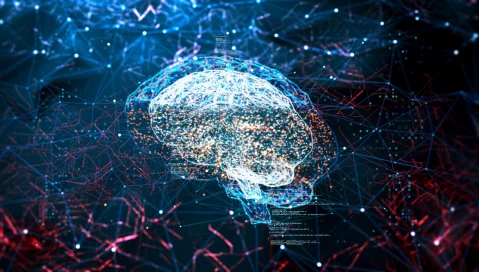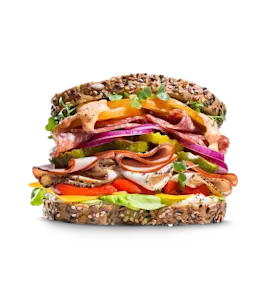5 formas en que la inteligencia artificial en la fabricación de alimentos está cambiando la industria para mejor
5 formas en que la inteligencia artificial en la fabricación de alimentos está cambiando la industria para mejor
5 formas en que la inteligencia artificial en la fabricación de alimentos está cambiando la industria para mejor
28 Sept 2021
Jack Payne
Al igual que en muchas industrias, la inteligencia artificial (IA) está causando sensación en el mundo de los alimentos y las bebidas. Cada vez más organizaciones dentro de la industria están reconociendo el potencial de la IA para impulsar una mayor eficiencia y ganancias, reducir el desperdicio y brindar protección contra las interrupciones de la cadena de suministro. Todo forma parte de lo que se conoce como Industria 4.0, la creciente aparición de tecnología inteligente como la IA en industrias tradicionales como la de alimentos y bebidas.
Por "IA" nos referimos simplemente a la maquinaria y las tecnologías utilizadas para llevar a cabo tareas complejas que antes requerían el pensamiento humano para completarlas. La IA en la industria alimentaria comprende una serie de tecnologías, desde la robótica hasta el aprendizaje automático. Aquí hay cinco formas en que la IA está transformando la industria de alimentos y bebidas para mejor:
1. Desarrollo de nuevas recetas guiadas por las tendencias de los consumidores
Todos los fabricantes de alimentos saben que deben buscar constantemente nuevas formas de actualizar sus líneas de productos para seguir siendo relevantes y aprovechar nuevas fuentes de ingresos. Mientras que tradicionalmente se ha realizado en forma de encuestas y se ha adaptado a las tendencias emergentes, la IA ofrece a las empresas la oportunidad de predecir las preferencias de sus clientes.
Al analizar grandes cantidades de datos sobre los patrones de ventas y las preferencias de sabor para cada grupo demográfico, los fabricantes ahora pueden modelar las tendencias futuras y desarrollar nuevos productos para capitalizarlos más rápido. La IA también se está utilizando para permitir a los consumidores un mayor grado de personalización en los productos que compran. Este avance no solo identifica cuáles son las combinaciones de sabores más populares, sino que hace que el proceso de desarrollo de productos sea más corto y menos costoso, lo que ayuda a las empresas a comercializar sus nuevos productos más rápido y con menos prueba y error.
2. Una mejor gestión de la cadena de suministro
Ser capaz de gestionar las cadenas de suministro de forma eficaz es una de las principales prioridades de los fabricantes de alimentos. Las empresas de vanguardia ahora están utilizando algoritmos basados en redes neuronales artificiales para monitorear los envíos en cada etapa de la cadena de suministro, mejorando los estándares de seguridad alimentaria y permitiendo una transparencia total.
La IA en la industria alimentaria también es capaz de crear previsiones precisas para gestionar el inventario y los precios. Este tipo de análisis predictivo ayuda a mantener a las empresas alimentarias un paso por delante, lo que les permite evitar el desperdicio y los costes innecesarios. Las cadenas de suministro de alimentos modernas son más complejas y fragmentadas que nunca, pero la IA permite a las empresas obtener una mejor visión general y, en última instancia, mejorar su capacidad para aumentar los ingresos.
3. Un proceso de limpieza más eficiente
Todos los equipos y maquinaria involucrados en la producción de alimentos deben limpiarse según los estándares más rigurosos. Esto no es solo para evitar la contaminación de los alimentos con patógenos, sino también para evitar la contaminación cruzada de alérgenos. Desafortunadamente, esto tiene un costo, tanto en términos de tiempo como de dinero.
La innovadora tecnología de IA está empezando a cambiar esto. Desarrollado por la Universidad de Nottingham, un sistema de autooptimización de limpieza in situ (SOCIP) utiliza imágenes de fluorescencia óptica y detección ultrasónica para escanear los restos de alimentos que quedan en la maquinaria después de su uso. Esto permite un proceso de limpieza más optimizado, donde la cantidad de agua necesaria se reduce en un 20-40% y el tiempo de limpieza se reduce en un 50%, porque ya no es necesario desmontar el equipo.
4. Líneas de producción más higiénicas
Las infracciones de la seguridad alimentaria pueden ser increíblemente costosas para los fabricantes de alimentos. Tanto en términos de multas (en el peor de los casos, las sanciones pueden ser de millones de dólares) como del daño reputacional asociado a la mala salud y seguridad. La IA en la fabricación de alimentos está reduciendo el riesgo de este tipo de infracciones de varias maneras.
Cuantas más partes del proceso de producción de alimentos puedan ser tratadas por robots, menos probable será que los productos se contaminen con patógenos. Los robots no solo pueden ser más rápidos y eficientes que los trabajadores humanos, sino que también pueden volverse completamente estériles. Sin embargo, para tareas más complejas, se requiere inteligencia artificial para permitir que estos robots lleven a cabo físicamente sus tareas y respondan a los cambios de manera similar a como lo haría un humano.
La IA también se puede utilizar para aumentar la limpieza de la mano de obra humana de un fabricante. Se están utilizando tecnologías de reconocimiento facial y de objetos para rastrear si se están siguiendo los protocolos de higiene. Por ejemplo, en los casos en los que se descuidan las prácticas de producción correctas o no se usan artículos de EPP, estos sistemas habilitados para IA los marcarán, lo que permitirá a las empresas mantener un control más estricto sobre la higiene en el sitio.
5. Clasificación de alimentos
La clasificación de alimentos es un proceso laborioso y lento que ralentiza la línea de producción y requiere el empleo de muchos miembros del personal. Esto es especialmente cierto cuando se trata de la clasificación de productos frescos, ya que los clasificadores humanos se encargan de eliminar todas las unidades que no cumplen con el estándar requerido para la venta.
La cantidad de tiempo y el número de personas necesarias para completar esta actividad crucial pueden reducirse en gran medida con la ayuda de la IA. Las cámaras y los láseres se utilizan para evaluar la forma, el color y la integridad estructural de cada elemento, identificando automáticamente los que deben filtrarse. Además, cuando se incorpore la tecnología de aprendizaje automático, estos sistemas lograrán una mejora continua en su precisión, lo que ayudará a reducir el desperdicio de productos aceptables.
Puedes obtener más información sobre cómo el sistema ERP de alimentos de Aptean ayudó a un cliente a integrar tecnología avanzada de IA para evaluar al instante la calidad de los aguacates en el proceso de clasificación.
Cómo su empresa de alimentos puede adoptar la IA
Si bien la inteligencia artificial está teniendo un gran impacto en la industria de alimentos y bebidas, todavía estamos en los primeros días de su uso. En la actualidad, estas tecnologías son utilizadas principalmente por grandes fabricantes debido a los costes que conlleva su implementación. Sin embargo, es inevitable que la IA algún día sea omnipresente en toda la industria.
Uno de los mayores retos a los que se enfrentará cuando quiera invertir en soluciones de IA es implementarlas en su pila tecnológica existente. Aquí es donde un sistema ERP diseñado específicamente para la industria de alimentos y bebidas puede marcar la diferencia. Es extremadamente ventajoso que las enormes cantidades de datos generados por las soluciones de IA fluyan instantáneamente a la base de datos centralizada de un sistema ERP. Esto permite a los usuarios de su organización alimentaria acceder y beneficiarse de la información generada por esta información.
Dado que la información producida por la IA se utiliza para informar sobre el desarrollo de nuevas recetas y la actividad de compra, es vital que esté disponible al instante. Y con nuestra solución Aptean Business Intelligence, impulsada por la IA y el aprendizaje automático, tu empresa tendrá una capacidad de previsión sin precedentes en lo que respecta al rendimiento futuro.
Para obtener más información sobre cómo nuestra solución de alimentos y bebidas especialmente diseñada, Aptean Food & Beverage ERP, puede ayudar a tu organización de alimentos y bebidas a preparar el terreno para la integración de la IA, ponte en contacto con nuestro equipo de expertos del sector de alimentos y bebidas hoy mismo.
¿Todo listo para transformar tu negocio?
Tenemos las soluciones ERP especializadas que necesitas para superar los desafíos de tu sector.



